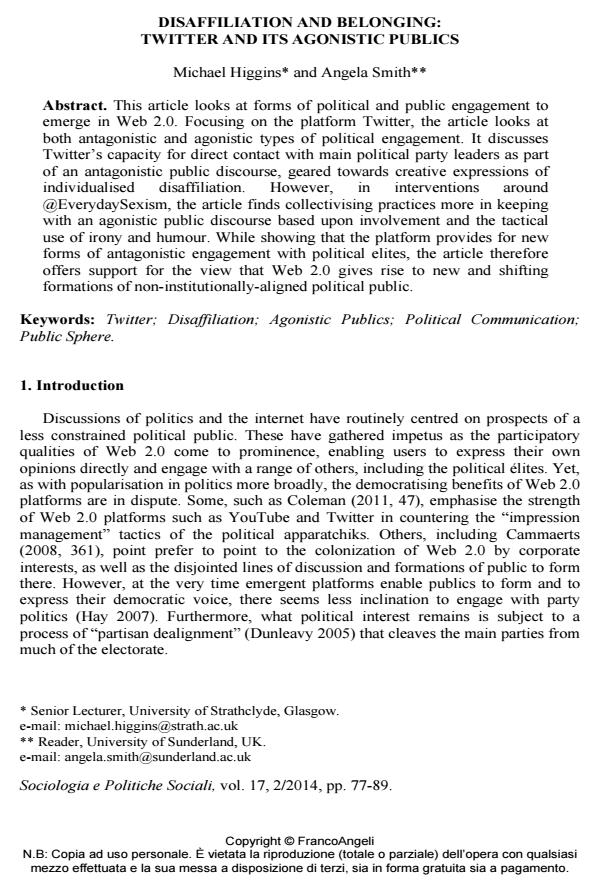Disaffiliation and belonging: twitter and its agonistic publics
Titolo Rivista SOCIOLOGIA E POLITICHE SOCIALI
Autori/Curatori Michael Higgins, Angela Smith
Anno di pubblicazione 2014 Fascicolo 2014/2
Lingua Italiano Numero pagine 13 P. 77-89 Dimensione file 168 KB
DOI 10.3280/SP2014-002005
Il DOI è il codice a barre della proprietà intellettuale: per saperne di più
clicca qui
Qui sotto puoi vedere in anteprima la prima pagina di questo articolo.
Se questo articolo ti interessa, lo puoi acquistare (e scaricare in formato pdf) seguendo le facili indicazioni per acquistare il download credit. Acquista Download Credits per scaricare questo Articolo in formato PDF

FrancoAngeli è membro della Publishers International Linking Association, Inc (PILA), associazione indipendente e non profit per facilitare (attraverso i servizi tecnologici implementati da CrossRef.org) l’accesso degli studiosi ai contenuti digitali nelle pubblicazioni professionali e scientifiche.
This article looks at forms of political and public engagement to emerge in Web 2.0. Focusing on the platform Twitter, the article looks at both antagonistic and agonistic types of political engagement. It discusses Twitter’s capacity for direct contact with main political party leaders as part of an antagonistic public discourse, geared towards creative expressions of individualised disaffiliation. However, in interventions around @EverydaySexism, the article finds collectivising practices more in keeping with an agonistic public discourse based upon involvement and the tactical use of irony and humour. While showing that the platform provides for new forms of antagonistic engagement with political elites, the article therefore offers support for the view that Web 2.0 gives rise to new and shifting formations of non-institutionally-aligned political public.
Parole chiave:Twitter; Disaffiliation; Agonistic Publics; Political Communication; Public Sphere.
- Voices of Supporters (ISBN:9789027213884)
- Crisis and the media Angela Smith, pp.231 (ISBN:9789027200341)
- Fedrekvotepolitikkens dynamikk Anne Lise Ellingsæter, in Tidsskrift for samfunnsforskning /2020 pp.323
DOI: 10.18261/issn.1504-291X-2020-04-01 - Emergent Twitter publics through political scandal Chamil Rathnayake, Angela Smith, Michael Higgins, in Journal of Language and Politics /2023 pp.458
DOI: 10.1075/jlp.22028.rat - Mediated populism, culture and media form Michael Higgins, in Palgrave Communications 3/2017
DOI: 10.1057/s41599-017-0005-4 - Mask communication: The development of the face covering as a semiotic resource through government public health posters in England and Wales Angela Smith, Michael Higgins, in Discourse, Context & Media 100651/2022 pp.100651
DOI: 10.1016/j.dcm.2022.100651 - Conflicting Policy Feedback: Enduring Tensions over Father Quotas in Norway Anne Lise Ellingsæter, in Social Politics: International Studies in Gender, State & Society /2022 pp.999
DOI: 10.1093/sp/jxaa027 - A Gossip Politic Michael Higgins, pp.27 (ISBN:978-3-031-15118-7)
- Twenty-first Century Feminism Angela Smith, pp.1 (ISBN:978-1-349-50468-8)
Michael Higgins, Angela Smith, Disaffiliation and belonging: twitter and its agonistic publics in "SOCIOLOGIA E POLITICHE SOCIALI" 2/2014, pp 77-89, DOI: 10.3280/SP2014-002005